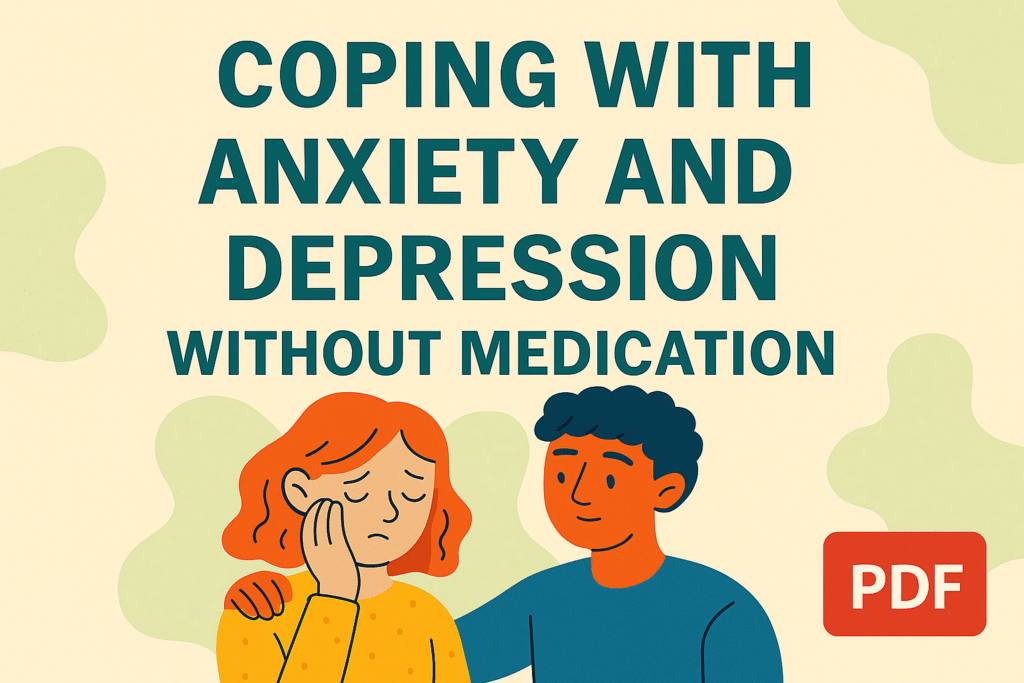In a world where stress often feels like a default setting, anxiety and depression have quietly crept into the lives of many. For some, medication becomes a necessary part of recovery. But for others, the journey toward healing takes a different path one that’s rooted in lifestyle, awareness, and gentle self compassion.
If you’re looking for Natural Ways to Cope with Anxiety and Depression Without Medication, you’re not alone and there are options that don’t involve prescriptions. This blog offers a compassionate, evidence informed guide to finding emotional balance naturally.
🌿 1. Start With the Breath: Mindfulness & Deep Breathing
One of the most immediate tools you have is your breath. Deep breathing techniques calm the nervous system, reduce heart rate, and help pull your focus away from spiraling thoughts. Mindfulness meditation, even for just 5 minutes a day, can build emotional resilience over time. Apps like Insight Timer or Headspace offer free guided meditations for beginners.
🛌 2. Prioritize Sleep Hygiene
Sleep and mental health are deeply connected. Anxiety often leads to sleepless nights, and lack of sleep can worsen depression. Simple changes like sticking to a bedtime routine, reducing screen time before bed, and avoiding caffeine late in the day can make a big difference. Your body and brain need rest to process emotion and repair.
🥗 3. Nourish Your Body to Heal the Mind
What we eat affects how we feel. Diets rich in whole foods especially those containing omega-3 fatty acids, leafy greens, nuts, seeds, and fermented foods support brain function and mood regulation. Reducing processed sugar and refined carbs can also help stabilize mood swings.

🏃♂️ 4. Move Gently, But Consistently
Exercise doesn’t have to be intense. A 20 minute walk, light yoga, or dancing to your favorite playlist can release endorphins your body’s natural mood boosters. Movement grounds us in the present and reminds us we’re alive and capable.
✍️ 5. Journal Your Thoughts, Not Your Judgments
Sometimes, the mind feels like a tangled mess. Writing things down can help. Journaling helps you express emotions that might otherwise stay bottled up. Don’t worry about grammar just write freely. It’s your space to be honest and unfiltered.
🤝 6. Stay Connected (Even If It’s Hard)
One of the toughest symptoms of anxiety and depression is withdrawal. But isolation only deepens the struggle. Try reaching out to someone you trust not to “fix” things, but to be heard.
Online support groups or community circles can also provide safe, non judgmental spaces to connect.
☀️ 7. Get Natural Light Every Day
Sunlight helps regulate your internal clock and boosts serotonin production the “feel good” neurotransmitter. Even a few minutes outdoors each morning can elevate mood and improve sleep. On darker days, consider using a light therapy box (after consulting a doctor).
🧠 8. Set Small, Achievable Goals
When even getting out of bed feels like a mountain, set the bar low and celebrate every win. Did you brush your teeth today? Make your bed? Send a message to a friend? These are victories. Building momentum, even slowly, is part of healing.
🙏 9. Practice Self Compassion, Not Perfection
You’re doing the best you can and that’s enough. Healing isn’t linear. Some days will feel harder than others. Instead of beating yourself up for feeling low, try offering yourself the same kindness you’d give a friend. That shift in inner dialogue can be transformative.
🌼 Final Thoughts
You don’t need to walk this path alone, and you don’t need to follow just one method of healing. Natural Ways to Cope with Anxiety and Depression Without Medication is possible for many, but it requires patience, consistency, and support. Remember what works for someone else might not work for you, and that’s okay.
The goal is not to be “perfectly fine,” but to feel a little more like yourself every day.
Visit more blogs for your daily life problems here


Pingback: Struggling to Wake Up Early? Here’s How to Fix Your Morning Routine - foncentra.com